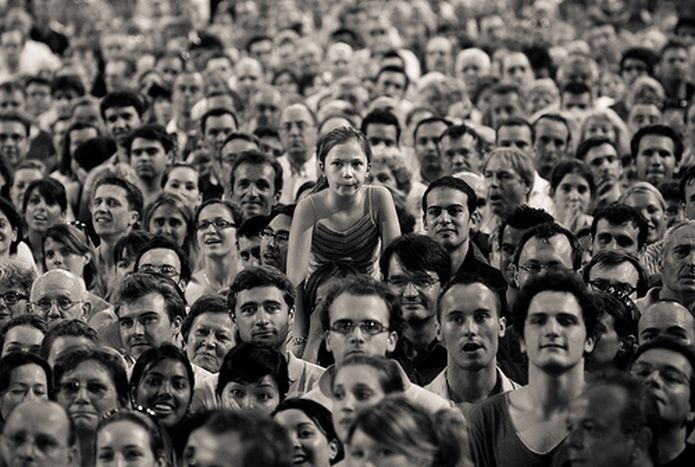
which president for which europe?
Published on
Translation by:
 Matthew Lye
Matthew Lye
The European elections will take place in less than a month throughout the whole of Europe, yet not all European citizens are forthcoming with interest and involvement in them. A question now arises from this situation, who is responsible? Does the lack of credibility reflect a lack of interest in the entire political establishment or is it just focused on the EU?
The election of the President of the Commission is the perfect illustration of this assessment. For the first time , Europeans will be able to elect the person who will head the EU's executive body over the next five years. If we go back to the last European elections in 2009, it is possible to realize that the situation has changed. The "re-election" of José Manuel Barroso as head of the European Commission in 2009 was not actually based on a purely democratic process. The Treaty of Maastricht in 1992 provided that indeed the President of the Commission should be appointed by mutual agreement between the Heads of State and the European Parliament must approve their choice. However in 2009, José Manuel Barroso was appointed President by the consent of Parliament. The Treaty of Lisbon entered into force in December 2009, however, could make some changes. Although democratic ambiguity is always present because once again it is the Council which will appoint the new president "taking into account the European Parliamentary elections" - TFEU -. If we are optimistic we could have a Chief Executive who would be designated according to the popular vote. It remains to be seen how this will be interpreted "taking into account the elections."
In 2014, for the first time, we are going to have official candidates for the presidency. Numbering 6 in total and 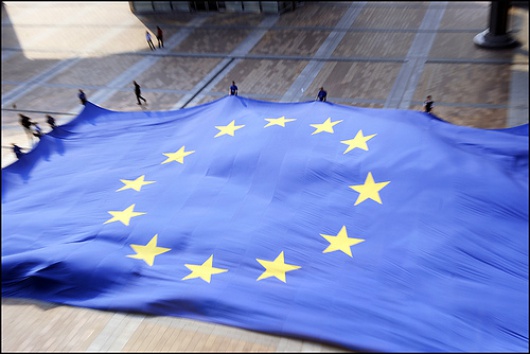 representing the major European parties they are competing at the moment to take over the leadership of the coveted Commission. It might be useful here, to paint a picture of the candidates. If you listen to gossip in Brussels the two main candidates (which are the most likely to be appointed) are Martin Schulz, currently President of the European Parliament and member of the Socialist Party (PSE), and Jean-Claude Juncker who is the party leader of the European People's Party (EPP) who are currently in the lead. The latter was the first President of the Eurogroup and recently defeated the French Michel Barnier in the party leadership contest. However, beside these two characters , four other candidates are also seeking to be heard. Guy Verhofstadt is the party leader of the Alliance of Liberals and Democrats for Europe (ALDE). The former Belgian Prime Minister who can be considered as the "third man", still has every chance of winning, the only real federalist he pleads for a more integrated Europe. Then follows two candidates of the European Green Party, the French anti-globalisation figure and former Vice-Chair of the Committee on Agriculture and Development of the European Parliament José Bové and the former German MEP Ska Keller was chosen to represent the Greens alongside José Bové. Finally, the Greek Alexis Tsipras who will represent the Party of the European Left (EL), has a well-documented political history given that he was asked to form a Greek coalition government in 2012, although it never happened.
representing the major European parties they are competing at the moment to take over the leadership of the coveted Commission. It might be useful here, to paint a picture of the candidates. If you listen to gossip in Brussels the two main candidates (which are the most likely to be appointed) are Martin Schulz, currently President of the European Parliament and member of the Socialist Party (PSE), and Jean-Claude Juncker who is the party leader of the European People's Party (EPP) who are currently in the lead. The latter was the first President of the Eurogroup and recently defeated the French Michel Barnier in the party leadership contest. However, beside these two characters , four other candidates are also seeking to be heard. Guy Verhofstadt is the party leader of the Alliance of Liberals and Democrats for Europe (ALDE). The former Belgian Prime Minister who can be considered as the "third man", still has every chance of winning, the only real federalist he pleads for a more integrated Europe. Then follows two candidates of the European Green Party, the French anti-globalisation figure and former Vice-Chair of the Committee on Agriculture and Development of the European Parliament José Bové and the former German MEP Ska Keller was chosen to represent the Greens alongside José Bové. Finally, the Greek Alexis Tsipras who will represent the Party of the European Left (EL), has a well-documented political history given that he was asked to form a Greek coalition government in 2012, although it never happened.
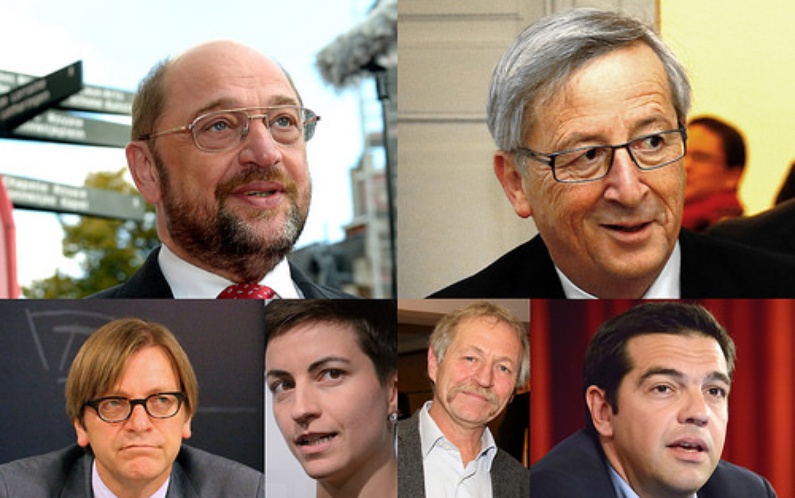 These six players are facing each other in a campaign that is struggling to be visible to the European citizen. Is the debate that should take place in the public sphere but has not, lacking in interest? Feeble attempts have however been implemented. For example, on 9 April 2014, Jean -Claude Juncker and Martin Schulz "went head-to-head" in a debate in French and English broadcast on France 24 and Radio France Internationale. But rather than actually launch the campaign and debate, this event only showed how the distinction between the agendas of both major parties is small. In Europe it is consensus and compromise that are set, however the lack of significant differences between the left-wing and right and the inability the two candidates had in reaching a decision on an issue does not encourage the interest that this election could bring.
These six players are facing each other in a campaign that is struggling to be visible to the European citizen. Is the debate that should take place in the public sphere but has not, lacking in interest? Feeble attempts have however been implemented. For example, on 9 April 2014, Jean -Claude Juncker and Martin Schulz "went head-to-head" in a debate in French and English broadcast on France 24 and Radio France Internationale. But rather than actually launch the campaign and debate, this event only showed how the distinction between the agendas of both major parties is small. In Europe it is consensus and compromise that are set, however the lack of significant differences between the left-wing and right and the inability the two candidates had in reaching a decision on an issue does not encourage the interest that this election could bring.
On Monday 28 April, 2014 a larger debate has been organized in Maastricht by Euronews between 4 of the 6 candidates. José Bové and Alexis Tsipras could not be present. It could have been considered a very good initiative; however the main TV channels did not broadcast the debate. France Télévision, for example, chose to block it, while the major national newspapers (LeMonde, ElPais, Repubblica, TheGuardian, BBC ...) did not even bother to mention its existence. Many things were said during an hour and a half of debate even if you could observe that the debate lacked substance and genuine political confrontation. Their political positions were virtually identical and once again it was compromise which came out on top. The debate focused on key subjects such as employment, economic policy, immigration policy and foreign policy in particular with regard to the issue of energy independence.
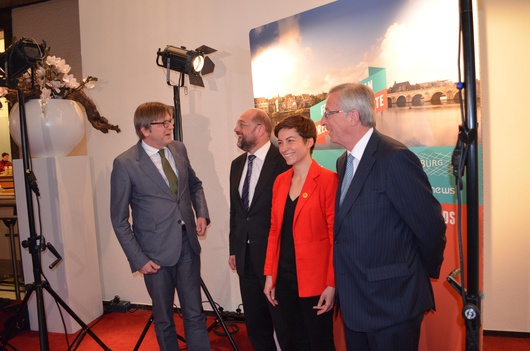 Ska Keller, the Green candidate, advocated a system based on a “Green New Deal” explaining "today we need investments, our economy must be greener. The target of 20% renewables is ridiculous; it should be much more ambitious.” She concluded the discussion by underlining that "we need a Europe that cares for people and not big business." Jean-Claude Juncker for his part focused on the economic aspect by saying that "I am for the creation of a European minimum wage," but he did not want anyone "to spend money we don't have, hence why I'm pro healthy finances.” Martin Schulz appeared to oppose the policies of the past 5 years, explaining that he wanted to be the president of European citizens and not of European states. Finally, Guy Verhofstadt focused his analysis on his commitment to establish a genuine European federalism.
Ska Keller, the Green candidate, advocated a system based on a “Green New Deal” explaining "today we need investments, our economy must be greener. The target of 20% renewables is ridiculous; it should be much more ambitious.” She concluded the discussion by underlining that "we need a Europe that cares for people and not big business." Jean-Claude Juncker for his part focused on the economic aspect by saying that "I am for the creation of a European minimum wage," but he did not want anyone "to spend money we don't have, hence why I'm pro healthy finances.” Martin Schulz appeared to oppose the policies of the past 5 years, explaining that he wanted to be the president of European citizens and not of European states. Finally, Guy Verhofstadt focused his analysis on his commitment to establish a genuine European federalism.
Even so, you could witness some demonstrations of disagreement and attempts at "aggression". For example, when Martin Schulz explained that in diplomacy you must find common interests and this must be applied to Russia, Guy Verhofstadt responded directly by saying that "It was very naive." Jean-Claude Juncker was himself attacked by the other three candidates on the composition of his party, the EPP, Ska Keller highlighted that there were members of the EPP party who voted against the measures in favour of women's rights while Martin Schulz took up Berlusconi’s intervention on Germany denouncing the party’s immobility.
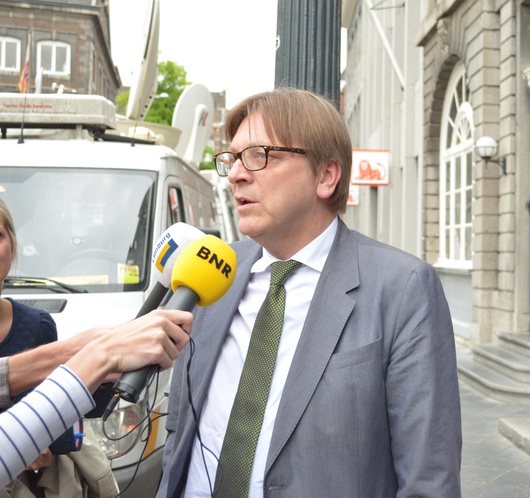 In conclusion, we can ask ourselves about the future legitimacy of the President of the Commission and their flexibility in responding to a more and more powerful Council. Guy Verhofstadt has confidence in the future of Europe though and the Commission, telling Cafébabel that “the change is that Parliament can now gather behind a majority and a candidate for the presidency of the Commission. It is a power that the parliament should use [so that the Commission can take back control of the council].” He therefore believes in the “This time is different”, slogan of the European Parliament for the elections in May. We hope he's right. There is less than a month until the elections with everything still to prove.
In conclusion, we can ask ourselves about the future legitimacy of the President of the Commission and their flexibility in responding to a more and more powerful Council. Guy Verhofstadt has confidence in the future of Europe though and the Commission, telling Cafébabel that “the change is that Parliament can now gather behind a majority and a candidate for the presidency of the Commission. It is a power that the parliament should use [so that the Commission can take back control of the council].” He therefore believes in the “This time is different”, slogan of the European Parliament for the elections in May. We hope he's right. There is less than a month until the elections with everything still to prove.
Translated from Quel président pour quelle Europe ?


